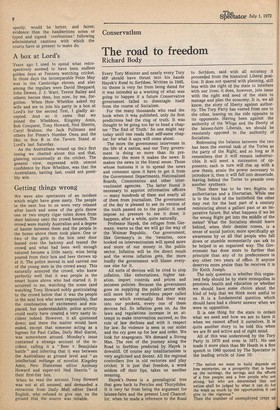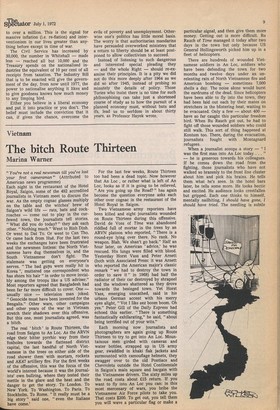Conservatism
The road to freedom
Richard Body
Every Tory Minister and nearly every Tory MP should have thrust into his hands Hayek's Road to Serfdom. Written in 1945, its theme is very far from being dated for it was intended as a warning of what was going to happen if a future Conservative government failed to disentagle itself from the course of Socialism.
For the many thousands who read the book when it was published, only its first predictions had the ring of truth. It was thought to be going too far to head a chapter 'The End of Truth.' So one might say today until one reads that self-same chapter: for what it says will come about.
The more the government intervenes in the life of a nation, and our Tory government is doing so more than its predecessor, the more it makes the news. It makes the news in the literal sense. Those whose business it is to spread the news and comment upon it have to get it from the Government Departments, Nationalised Boards, Commissions and other interventionist agencies. The latter found it necessary to appoint information officers — many hundreds of them and nearly all of them from journalism. The government of the day is pleased to see its version of the truth passed on to the public: it need impose no pressure to see it done; it happens, after a while, quite naturally.
Professor Hayek, the refugee from Germany, warns us that we will go the way of the Weimar Republic. Our government, like Germany's in the 'twenties, once hooked on interventionism will spend more and more of our money in the public sector. Inflation will be the direct result and the worse inflation gets, the more loudly the government will blame everyone else for it.
All sorts of devices will be tried to stop inflation, like exhortations, higher taxation, import controls and prices and incomes policies. Because the government goes on supplying the public sector with still more bits of worthless paper called money which eventually find their way into our pockets, every one of these devices fail. So inflation goes on. As the laws and regulations increase in an attempt to make intervention succeed, so the rule of law declines and with it respect for law. So violence is seen in our midst and the cry goes up for law and order. We look for scapegoats. We demand a Strong Man. The rest of the journey along the Road to Serfdom predicted by Hayek is downhill. Of course any totalitarianism is very anglicised and decent All the regional controllers live in old rectories and play cricket. It is just that freedom, a word seldom off their lips, takes on another meaning.
Hayek's theme is a genealogical tree that goes back to Pericles and Thucydides. It is very far from being the argument for laissez-faire and the present Lord Chancellor, when he made a reference to the Road to Serfdom, said with all accuracy it proceeded from the historical Liberal position. It does not quarrel with planning, still less with the right of the state to interfere with our lives; it does, however, join issue with the right and need of the state to manage and plan the economy. It is, we all know, the story of liberty against authority. The Tory Party has veered from one to the other, leaning on the side opposite to its opponents. Having been against the authority of the Whigs and the liberty of the laissez-faire Liberals, we should be resolutely opposed to the authority of Socialism.
Redressing the balance between the two has been the eternal task of the Tories as the party of the Right, and so long as it remembers that it will remain indestructible. It will meet a succession of opponents; each in turn will rise up with a new thesis, attain the power necessary to introduce it, then it will fall into desuetude, leaving behind the Tories to preside over another synthesis.
Thus there has to be two Rights, an authoritarian and a libertarian. While one is in the thick of the battlefield the other may ,rest for the best part of a century reminiscing about a gallant past or an imperative future. But what happens if we let the wrong Right get into the middle of the melee? What the Socialists should leave behind, when their demise comes, is a sense of social justice; more specifically an awareness by us all that people who fall down or stumble momentarily can ask to be helped in an organised way. The Government has done more to further that principle than any of its predecessors in any other two years of office. If anyone deserves more praise than he receives it is Sir Keith Joseph.
The only question is whether this organised help should be by state monopolies in pensions, health and education or whether we should have some choice about the kind of help that we think most useful to us. It is a fundamental question which should have had a clearer answer when we were in opposition.
It is one thing for the state to ordain what we need and how we are to have it when we cannot afford it ourselves. It is quite another story to be told this when we are fit and active and of right mind.
All of this was understood by the Tory Party in 1970 and even in 1971. No one made it more plain than Mr Heath in a fine speech in 1969 quoted by The Spectator in the leading article of June 10:
"The nation we want to build depends on free enterprise, on a prosperity that is based on the earnings, the savings and the efforts of a free people; and a free people who are strong, but who are determined that our nation shall be judged by what it can do for the weak as much by the opportunities it can give to the vigorous."
Then the number of unemployed crept up
to over a million. This is the signal for massive inflation (i.e. re-flation) and interventionism in our lives greater than anything before except in time of war.
The Civil Service has increased by 30,000, the number in Whitehall — made less — reached all but 10,000 and the Treasury spends on the nationalised industries the equivalent of 10 per cent of all receipts from taxation. The Industry Bill that is to be enacted will give the government of the day, from now until 1977, the power to nationalise anything it likes and to give goodness knows how much money to any limping bird.
Either you believe in a liberal economy and put it into practice or you don't. The belief must include the conviction that it can, if given the chance, overcome the evils of poverty and unemployment. Otherwise one's politics has little moral basis. The worry is that authoritarian mandarins have persuaded overworked ministers that a return to liberty should be at least postponed to allow collectivism to succeed.
Instead of listening to such dangerous and interested special pleading they — and the whole Right — should re-examine their principles. It is a pity we did not do this more deeply after 1964 as we did so after 1945, instead of probing so minutely the details of policy. Those Tories who insist there is no time for such philosophising can take just a shortened course of study as to how the pursuit of a planned economy must, without buts and ifs, lead us to serfdom in about thirty years, as Professor Hayek wrote.























































 Previous page
Previous page